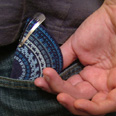

Secular sector shrinking, study shows
Research study conducted by Israel Democracy Institute reveals percentage of seculars has dropped by 50% in past 30 years. Ashkenazi academics less observant than others; there are hardly any Sephardim who define themselves 'secular.' And how does religious affiliation affect political opinions?
A new study conducted by the Israel Democracy Institute shows that the secular sector in Israel is shrinking: Only 20% of Jewish Israeli citizens define themselves secular – the lowest number in 34 years.
According to the data, the traditional sector has maintained its dominancy over the last three decades and currently accounts for 47% of the population. The ultra-Orthodox and religious sectors comprise another 33%.
The study was conducted by Eliyahu Sapir and was based on the Democracy Institute's Guttman Center's Israeli Democracy Index. The 2007 Index polled 1,016 respondents who were a representative sample of Israel’s adult, Hebrew-speaking Jewish population.

Photo: AFP
Sapir found that over last three decades the ratio of traditionals has been rising over the years while the ratio of seculars has been continuously dropping (from 41% to 20%) with the most acute drop occurring in the last decade (from 32% in 2001 to 20% in 2007). It should be noted that 1974 was the first and only year in which there was a secular plurality (41%).
Sapir also examined the respondents' heritage and its influence on religious affiliation. As predicted, the findings showed that the Sephardim are the most observant sector – 56% are religious and/or ultra-Orthodox and 7% seculars. In the Ashkenazi group, 36% reported they are secular versus 17% who said they were religious or ultra-Orthodox.
Another correlation was found between the respondents' age and the religious affiliation. 39% of the respondents ages 40 and under define themselves religious. Among 40-59 year olds, the number drops to 32%, and down to 20% among respondents' 60 years old and over.
'Society has gone through dramatic changes'
How does education fit in? Data indicate that there is an inverse ratio between education and observance: Of high-school educated respondents, 47% are traditional, 37% religious and 16% secular. Among college-graduates the number of religious drops to 24% and the number of traditional rises to 50%. Twenty-six percent of college-graduates are secular.Finally, some politics: In the religious group 71% are right-wing, compared with 49% of the traditional and 43% of secular. Only 8% of religious, 21% of traditional and 27% of secular reported they are left-wing. If your name is Ehud Olmert you might find the overall picture worrisome: 18% of respondents identified themselves as "left," 27% "center" and 55% see themselves as "right wingers."
Researcher Eliyahu Sapir told Ynet that the Israeli society has gone through dramatic changes in the past three decades (political reforms, rapid economic growth, increase in population, and four wars), and that sociologists' predictions that the society will be secularized – were proved false.
Sapir said he was surprised to learn that young Israelis are more observant than older ones: "That means that when these youngsters age, the society will be even more traditional than it is today."















